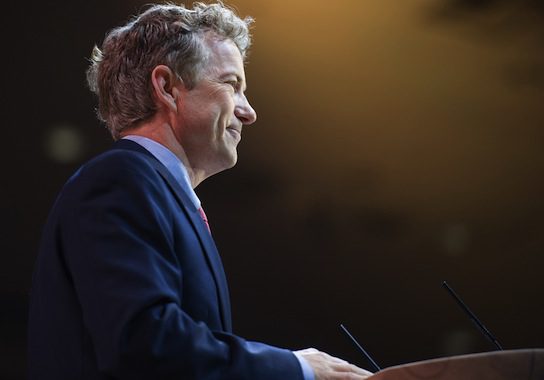Peter King and the Hawks’ Hysterical Attacks on Rand Paul

New York Congressman and potential 2016 presidential candidate Peter King put points on the soundbite scoreboard yesterday with a fiery appearance on MSNBC’s “Morning Joe.” Host Joe Scarborough was happy to escalate the intra-party war between the hawkish Republican establishment and Sen. Rand Paul.
“Let’s start with Rand Paul,” Scarborough said. “I take it that you would not be comfortable with Rand Paul being the commander-in-chief.”
“His views would be disastrous, Joe. I think he appeals to the lowest common denominator,” King said of the man who has assumed a contentious front-runner status for the Republican presidential nomination.
For advocates of a limitless global American military presence, Paul’s rising popularity is an existential threat to the GOP as we have known it for generations. The suddenness of Paul’s rise has unleashed a flood of conservative-on-conservative invective. Paul’s views have been described as “nakedly unacceptable … unhinged … lunacy” (Bret Stephens in the Wall Street Journal), “fringe … extremism … hooey” (Jennifer Rubin at the Washington Post) and “dewy-eyed foolishness” that is “more appropriate to a dorm-room bull session than the Situation Room” (Rich Lowry at National Review).
And that was just last week.
Last month, former Bush press secretary Ari Fleischer told Time that Paul has “a naiveté that’s going to be a problem.” In the midst of Paul’s 13-hour filibuster protesting President Obama’s drone powers last spring, Sen. John McCain uttered what remains Paul’s most enduring label, when he called his younger senate colleague a “wacko bird.”
Paul’s policy deviations are significant, but the “wacko bird” wasn’t taken seriously until the polls showed that his message was catching on with voters. Now that he represents an unquestionable insurgency within the GOP rank and file, the establishment has finally roused itself into an organized counter-attack. Rubin is leading the media charge (she wrote four Paul hit pieces in the last four days), while anonymous donors huddled around a Time reporter to deliver a mafioso message in Las Vegas—they will bury Rand Paul’s candidacy in its infancy.
Paul is marching on, wrangling over the Reagan legacy even as his foes tar him as a strident leftist for remarks he made in a 2009 video where he seemed to implicate former Vice President Dick Cheney in wanton war profiteering. On ABC’s “This Week,” this week, Paul said that Cheney “loves his country.” And while he said that he does not question Cheney’s motives, he reiterated that the former veep’s role at Halliburton, a major defense contractor for Operation Iraqi Freedom, created “a chance for a conflict of interest.”
Paul is being careful with this messaging, but only to a point. He is not holding back his belief in what constitutes “realism” in foreign policy, a worldview that he maintains is the more authentic conservative and Reaganesque model. In the weekend interview, he pointed to what he sees as the hypocrisy and recklessness of diplomatic bellicosity. To hawks who claim that the United States will not accept a nuclear Iran under any circumstances, Paul offered a historical comparison.
“We woke up one day and Pakistan had nuclear weapons,” he said. “If that would have been our policy towards Pakistan, we would be at war with Pakistan.”
In an op-ed in Wednesday’s Washington Post, he distilled the point:
“If, after World War II, we had preemptively announced that containment of nuclear powers would never be considered, the United States would have trapped itself into nuclear confrontations with Russia, China, Pakistan, India and North Korea.”
To Peter King, these are the views of “an isolationist wing from the 1930s.” In his bulldog appearance Wednesday morning, King said that Paul’s views on foreign policy, drones, and domestic surveillance are at “a hysterical level” that is “feeding into paranoia.”
This is the same Congressman King who, in a 2004 radio interview with Sean Hannity, said that “80 to 85 percent of mosques in this country are controlled by Islamic fundamentalists.” American Muslims, King said at the time, are “an enemy living amongst us.”
It seems apparent that, of the two men, King has engaged in the greater fear-mongering. While Paul may have entertained some far-fetched hypotheticals about drones wiping out a Starbucks, the Pentagon would survive a Paul presidency. He is far more moderate on defense spending than his father ever was, and skepticism of government overreach is arguably a core American value. One of these men may be prone to paranoid hysteria, but it isn’t Rand Paul.
Michael Ames reports on politics, culture, and land issues. He lives in Brooklyn, New York. Follow him on Twitter @mirkel
Comments